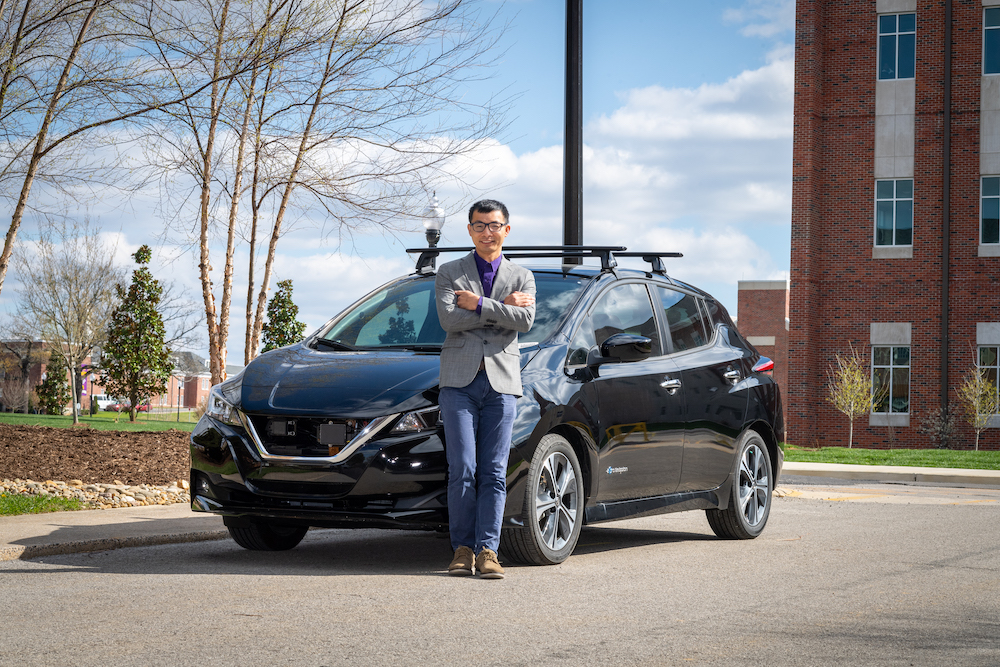Pingen Chen

Ever since Pingen Chen arrived at Tennessee Tech in 2016, the assistant professor in mechanical engineering has been driving students to learn about the automotive industry.
Chen established the Automotive Powertrain and Emissions Control Laboratory, mainly focusing his research on modeling, diagnostics, controls, and optimizations of various automotive systems including conventional/hybrid/electric powertrains, electric vehicle eco-system, internal combustion engines, emissions control systems, automated and connected vehicles, energy-efficient mobility systems, and advanced engine combustion with alternative/renewable fuels.
“Tennessee Tech is a great place to work,” said Chen. “Tennessee Tech has a vision to develop transformative technology for the automotive sectors. I am here to serve. My career plan has aligned with the university’s vision.”
Since coming to Tech, Chen’s research interests have included modeling and control of engines, emission control, automated and connected vehicles, electric vehicle control and optimization, and nonlinear control and optimization.
“Another reason why I came here is to develop a vehicle engineering program,” said Chen. “That is very unique in the state of Tennessee and the nation, developing a workforce to serve the rapidly changing automotive sectors. It’s to not only serve in the conventional vehicle sector, but also the electric vehicle sector as well as automated and connected vehicle sectors.”
Chen says the scope of his research has changed in the five years he has been at Tech. He mostly worked with vehicles powered by internal combustion engines. But, as society is changing, so is his research.
“As we experience the global warming issues and to fight energy crisis, electric vehicles have become big players in the automotive industry,” Chen explained. “I have adapted myself from conventional vehicle-related research to electric vehicle-related research. My goal now is to understand how an electric vehicle can impact society through fuel saving and diverse fuel resources.”
It’s the research on electric vehicles as well as automated and connected vehicles that he is driving his students toward.
“In Dr. Chen’s group, there are several different specifications and projects that he is on,” said Max Lamantia, a Ph.D. student in mechanical engineering in Chen’s research group. “On the autonomous vehicle, we are working on the automatic breaking and the adaptive cruise control. We are going to be working on lane-keep assist in the future.”
Dennis Schafer, who is also a graduate student in mechanical engineering, is working with Chen and Lamantia. He says he enjoys the hands-on experience he is getting at Tech.
“It’s been a great learning experience,” said Schafer. “I’ve learned to solder and crimp wires and dive deeper into the controls aspect of it.”
Schafer, Lamantia and Chen have been working on inter-vehicle communication, specifically an adaptive cruise control where the vehicles communicate their position in different parameters.
“When we built our first cruise control for the car and saw it drive without anyone touching the pedal, I think that is what hooked me,” said Schafer. “It’s rewarding to see our hard work pay off with the car being able to start going, handle speeds and then stop. Everyone knows cruise control comes in cars, but when you build it yourself, that’s what keeps you hooked.”
Chen’s electric car research includes putting a charging station network through the Upper Cumberland region to help eliminate some of the barriers that restrict electric car ownership in rural areas. EV stations have been placed at Tech and in counties surrounding Putnam County in an effort to bring more electric cars to the areas.
Between his electric car research and automated and connected car research, Chen keeps his students on the right track for learning and experiencing the cutting-edge technology in the automotive industry.
“Our future transportation system will become smarter because of the connectivity and automation and that can help reduce the fatalities as well as saving fuel,” said Chen. “We want to help the best way we can.”

